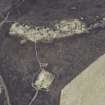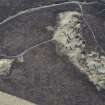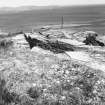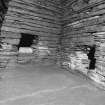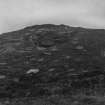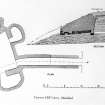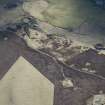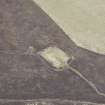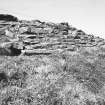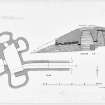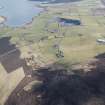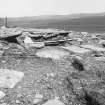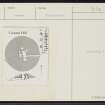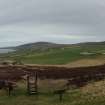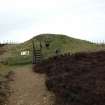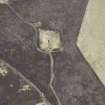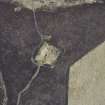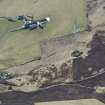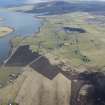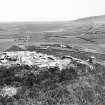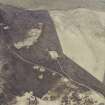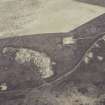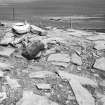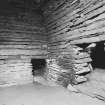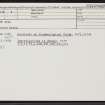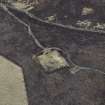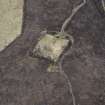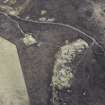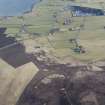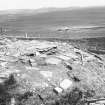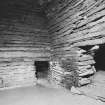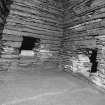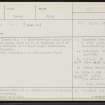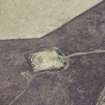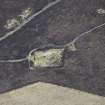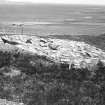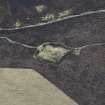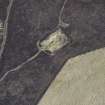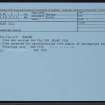Cuween Hill
Animal Burial(S) (Late Neolithic), Chambered Cairn (Late Neolithic), Inhumation(S) (Late Neolithic)
Site Name Cuween Hill
Classification Animal Burial(S) (Late Neolithic), Chambered Cairn (Late Neolithic), Inhumation(S) (Late Neolithic)
Alternative Name(s) Kewing Hill
Canmore ID 2059
Site Number HY31SE 1
NGR HY 3642 1277
Datum OSGB36 - NGR
Permalink http://canmore.org.uk/site/2059
- Council Orkney Islands
- Parish Firth
- Former Region Orkney Islands Area
- Former District Orkney
- Former County Orkney
HY31SE 1 3642 1277.
(HY 3636 1271) Cuween Hill - a Maes-Howe-type round grass-covered chambered cairn, about 55ft in diameter and 8ft 6 ins high, with evidence of at least eight interments.
A S Henshall 1963; RCAHMS 1946; M M Charleson 1902; V G Childe and W D Simpson 1961 also Orkney Herald 20 June 1888 and The Orcadian June 23rd 1888.
Cuween Hill chambered cairn is as described and illustrated by the above authorities.
Surveyed at 1/2500.
Visited by OS (NKB) 22 April 1966.
Publication Account (1996)
You must enter this tomb as did neolithic man, uncomfortably on your hands and knees! But it is worth the effort of crawling along the 5.5m long passage, not just to see the burial chamber but also to appreciate the psychology behind the design of the tomb and the practical difficulties of any funerary rituals. This is a Maes Howe type of chamber, set within a circular cairn (the roof is modern); the main chamber has four side-cells, one of them double, and the quality of the masonry is very high. Both chamber and cells were cut into solid bedrock and, like Maes Howe, the entrances into the cells are somewhat higher than the chamber floor. When first explored in the 19th century, the skulls of twenty-four dogs were found on the floor of the chamber, perhaps as a token of tribal identity. There were also the remains of eight skeletons in the main chamber and cells.
Information from ‘Exploring Scotland’s Heritage: Orkney’, (1996).
Note (2020)
Cuween Hill
This burial site in Orkney Islands was a focus for funerary practices in the Neolithic period, between 2900 BC and 2451 BC.
Prehistoric Grave Goods project site ID: 60072
CANMORE ID: 2059
Total no. graves with grave goods: 1
Total no. people with grave goods: 1
Total no. grave goods: 25
Prehistoric Grave Goods project Grave ID: 74035
Grave type: Chamber
Burial type(s): Inhumation
Grave good: Animal Burial (Specified type); Materials used: Bone/Antler/Horn/Ivory/Tooth (Animal) [Bone]; Current museum location: Unknown
Grave good: Animal Burial (Specified type); Materials used: Bone/Antler/Horn/Ivory/Tooth (Animal) [Bone]; Current museum location: Unknown
Grave good: Animal Joint/Part; Materials used: Bone/Antler/Horn/Ivory/Tooth (Animal) [Bone]; Current museum location: Unknown
Grave good: Animal Joint/Part; Materials used: Bone/Antler/Horn/Ivory/Tooth (Animal) [Bone]; Current museum location: Unknown
Grave good: Animal Joint/Part; Materials used: Bone/Antler/Horn/Ivory/Tooth (Animal) [Bone]; Current museum location: Unknown
Grave good: Animal Joint/Part; Materials used: Bone/Antler/Horn/Ivory/Tooth (Animal) [Bone]; Current museum location: Unknown
Grave good: Animal Joint/Part; Materials used: Bone/Antler/Horn/Ivory/Tooth (Animal) [Bone]; Current museum location: Unknown
Grave good: Animal Joint/Part; Materials used: Bone/Antler/Horn/Ivory/Tooth (Animal) [Bone]; Current museum location: Unknown
Grave good: Animal Joint/Part; Materials used: Bone/Antler/Horn/Ivory/Tooth (Animal) [Bone]; Current museum location: Unknown
Grave good: Animal Joint/Part; Materials used: Bone/Antler/Horn/Ivory/Tooth (Animal) [Bone]; Current museum location: Unknown
Grave good: Animal Joint/Part; Materials used: Bone/Antler/Horn/Ivory/Tooth (Animal) [Bone]; Current museum location: Unknown
Grave good: Animal Joint/Part; Materials used: Bone/Antler/Horn/Ivory/Tooth (Animal) [Bone]; Current museum location: Unknown
Grave good: Animal Joint/Part; Materials used: Bone/Antler/Horn/Ivory/Tooth (Animal) [Bone]; Current museum location: Unknown
Grave good: Animal Joint/Part; Materials used: Bone/Antler/Horn/Ivory/Tooth (Animal) [Bone]; Current museum location: Unknown
Grave good: Animal Joint/Part; Materials used: Bone/Antler/Horn/Ivory/Tooth (Animal) [Bone]; Current museum location: Unknown
Grave good: Animal Joint/Part; Materials used: Bone/Antler/Horn/Ivory/Tooth (Animal) [Bone]; Current museum location: Unknown
Grave good: Animal Joint/Part; Materials used: Bone/Antler/Horn/Ivory/Tooth (Animal) [Bone]; Current museum location: Unknown
Grave good: Animal Joint/Part; Materials used: Bone/Antler/Horn/Ivory/Tooth (Animal) [Bone]; Current museum location: Unknown
Grave good: Animal Joint/Part; Materials used: Bone/Antler/Horn/Ivory/Tooth (Animal) [Bone]; Current museum location: Unknown
Grave good: Animal Joint/Part; Materials used: Bone/Antler/Horn/Ivory/Tooth (Animal) [Bone]; Current museum location: Unknown
Grave good: Animal Joint/Part; Materials used: Bone/Antler/Horn/Ivory/Tooth (Animal) [Bone]; Current museum location: Unknown
Grave good: Animal Joint/Part; Materials used: Bone/Antler/Horn/Ivory/Tooth (Animal) [Bone]; Current museum location: Unknown
Grave good: Animal Joint/Part; Materials used: Bone/Antler/Horn/Ivory/Tooth (Animal) [Bone]; Current museum location: Unknown
Grave good: Animal Joint/Part; Materials used: Bone/Antler/Horn/Ivory/Tooth (Animal) [Bone]; Current museum location: Unknown
Grave good: Animal Joint/Part; Materials used: Bone/Antler/Horn/Ivory/Tooth (Animal) [Bone]; Current museum location: Unknown
Further details, the full project database and downloads of project publications can be found here: https://doi.org/10.5284/1052206
An accessible visualisation of the database can be found here: http://blogs.reading.ac.uk/grave-goods/map/
Orkney Smr Note
'...traces of a rectangular chamber running N and S came to
light, the walls widening as the excavation proceeded downwards,
and after reaching a depth of three or four feet the work was
continued longitudinally, which revealed the entire length of the
chamber. Up to this point debris consisted of slabs of various
sizes, earth, and animal remains. At a depth of about 6ft lateral
recesses, five in number, were discovered, one of which
subsequently proved to be the end of the entrance passage'.
Information from Orkney SMR [n.d.]













































